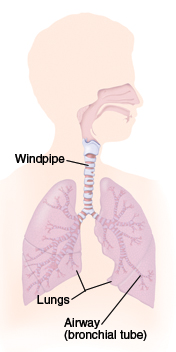What Is Asthma?

Asthma is a long-term (chronic) lung disease. The airways become inflamed. The airways
may be sensitive to:
-
Allergens. These are things that cause allergic reactions, such as dust or pet dander.
-
Irritants. These are things in the air, such as tobacco smoke or pollution.
-
Other. These are things like weather changes or respiratory infections.
These things trigger changes in the airways. In asthma, airway changes include:
All of these things cause the airways to narrow. This makes it hard for air to go
in and out of your lungs.
These changes in the airways cause asthma symptoms. Common symptoms of asthma are:
Asthma differences
Asthma varies from person to person. It can also change over time for each person.
The differences are:
|
Differences
|
Details
|
|
Triggers
|
-
Triggers are things that make asthma worse.
-
Some people may have only 1 trigger. Others may have many.
-
Some triggers may be allergens or irritants, or a combination.
-
In some people asthma may get worse with exercise, extreme emotions, season changes,
or other illnesses.
|
|
Symptoms
|
|
|
Severity of symptoms
|
-
May be mild. They don’t interfere with daily activities.
-
May be moderate. They interfere with some activities.
-
May be severe. They interfere with work or school and make it hard to sleep. May need
frequent emergency room visits or stays in the hospital.
|
|
Frequency of flare-ups
|
-
Flare-ups are when symptoms get worse.
-
Some people may never have flare-ups.
-
Some people may have them once in a while.
-
Some people may have them very often.
|
|
Control of symptoms
|
-
Some people have few symptoms if they stay away from triggers.
-
Some people need to take medicines.
-
Some people have trouble, even if they stay away from triggers and take medicines.
|
Facts about asthma
-
Asthma has no cure. But most of the time, symptoms can be controlled by taking medicines
and staying away from triggers.
-
An Asthma Action Plan is key to good asthma control. It is a personal worksheet created
by you and your healthcare provider. It shows what to do if you have asthma symptoms.
It also tells you when to call your provider or when to call 911. And when to go to the emergency room.
-
It affects all ages, from babies to older adults.
-
It can start at any age. Some people have asthma as children but outgrow it. Some
people get asthma as adults.
-
Experts don't know for sure what causes asthma. They think it is caused by a mix of
things. Some are inherited and some are environmental.
How daily issues affect your health
Many things in your daily life impact your health. This can include transportation,
money problems, housing, access to food, and childcare. If you can’t get to medical
appointments, you may not receive the care you need. When money is tight, it may be
difficult to pay for medicines. And living far from a grocery store can make it hard
to buy healthy food.
If you have concerns in any of these or other areas, talk with your healthcare team.
They may know of local resources to assist you. Or they may have a staff person who
can help.